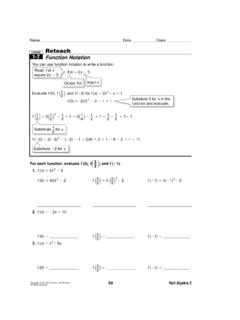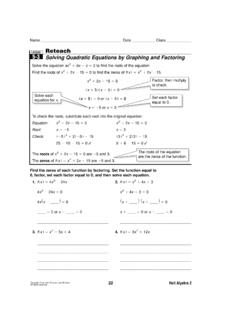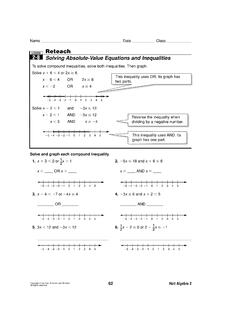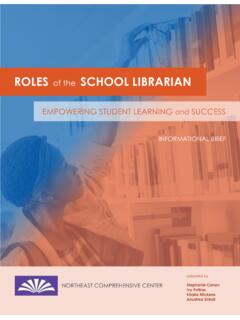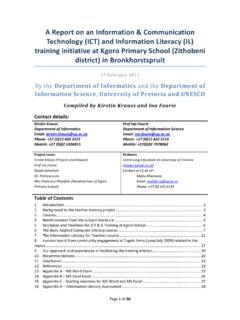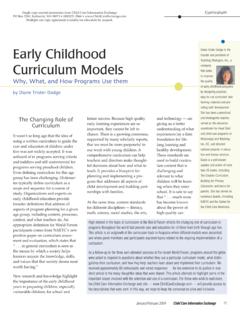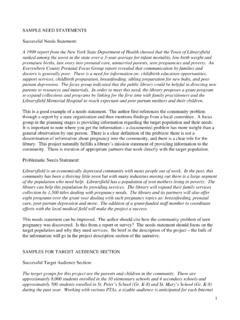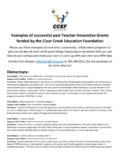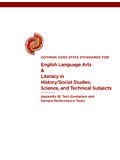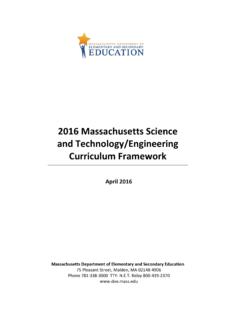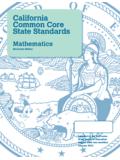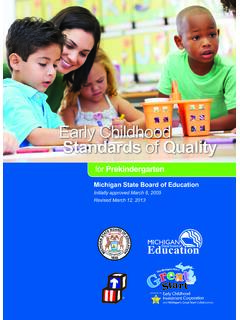Transcription of Research Project Guide - Humble Independent School District
1 Research Project Guide A Handbook for Teachers and Students A Research Project encompasses the collection of relevant information from a variety of sources with the intention of becoming thoroughly informed about an engaging topic for the purpose of communicating knowledge to an audience. The purpose of this Guide is to provide a sequential plan for the Research process along with effective tools for successful implementation. Written and Compiled by: Louise Lankau, Ruth Parrish, Linda Quillin, and Susan Schilling with input from the Humble ISD library Group. Special thanks to Kathye Milburn for help with word processing and Gina Daigle (Secondary Language Arts Coordinator) for her support and assistance with Research TEKS objectives and District writing initiatives. TABLE OF CONTENTS. III. MIDDLE School . The Research Process (Middle School ) -------------------------------------3.
2 Planning the Project ---------------------------------------- --------------4. Task Definition ---------------------------------------- -------------------6. information Seeking Strategies ---------------------------------------1 1. Location & Access, Use of information ----------------------------- -16. Taking Notes and Crediting Sources --------------------------------37. Synthesis: Organize Notes/Create Rough Draft and Final P------ 46. Evaluation ---------------------------------------- ------------------------47. Middle School Research Process Big6: (1) Task Definition Topic: A good topic should have enough available information at the student's grade, ability, and interest level. 1. Locate a topic in teacher's list, textbooks, and/or library sources. 2. Help narrow or broaden a topic by reading about it in an encyclopedia. 3. Find at least three different sources: books, online resources, experts.
3 Subtopics: A good subtopic answers: What do I want to know about my topic? 1. Person: Early life, education, accomplishments 2. Place: History, leaders, government, people, economy 3. Thing: Who, what, when, where, why/how 4. Specific subtopics can be located in an encyclopedia's subheadings. Big6: (2) information Seeking Strategies Sources: A good source is easily readable by the student and has information that matches the topic and subtopics. 1. Use a minimum of three sources of information . 2. Use various formats (the form information comes in) for information . Print: books, encyclopedias and other reference books, magazines, newspapers Nonprint: Research databases, Internet sites, software, videos Big6: (3 & 4) Location & Access, Use of information Read/Think/Select: Research should engage one in reading, evaluating, and understanding the information .
4 1. Read an entire chunk of information before selecting facts. 2. Think: What was important in the chunk read? 3. Select key facts (which match the subtopics). Use a graphic organizer or note cards for recording facts. Record keywords or important facts no sentences. Use quotation marks and appropriate citation when copying complete sentences. (Remember not to plagiarize.). 4. Give credit to each source of information . Use MLA-style citations. Big6: (5) Synthesis Organize Notes/Create Rough Draft/Create Final Product: Organizing before writing makes everything more logical and easier to produce. 1. Arrange notes into subtopic section. 2. Put notes into logical order for writing. Using an outline is often helpful at this point. 3. Create a rough draft of product (written report, poster, slide show, etc.). 4. Create final Research product and include a list of sources following MLA guidelines.
5 Big6: (6) Evaluation Ask: Judging what has been done helps find areas that need to be improved. 1. How well is my Project organized? 2. Do I have enough reliable information ? 3. Did I follow all Research guidelines? 4. Am I proud of my Project ? TEACHER TIPS. Include your librarian in the planning of the Project and in the teaching of Research skills. Check with your librarian on availability of age appropriate resources. Use the sample planning sheets, graphic note taking organizers, documentation sheets, product ideas, and evaluation forms included in this Guide . Be aware that giving your students opportunities to learn Research skills not only meets TEKS objectives but it also helps them become better problem solvers and critical thinkers. Using the library Media Center for Research Teacher Date Subject taught My class needs to use the library media center on (date): The purpose of our visit is: The topics/subjects the students will be researching are: Please answer the following questions (underline the Yes/No answer): 1.
6 Will you be using the Big6 Research process? Yes No If yes, do you want a Big6 Research Project web page created for access from the library Media Center website? Yes No 2. Is instruction by the LMC staff necessary? Yes No If the answer is yes, what instruction is needed? (Be specific.). 3. Do you want specific titles / materials reserved and placed on a reserve cart for student use? Yes No If the answer is yes, which materials do you want to reserve? 4. Will your students need to use the Internet? (They must have signed and returned the HISD Acceptable Use Policy.) Yes No 5. Do you need a bibliography of materials available from our LMC? Yes No If the answer is yes, what is the subject of the bibliography? 6. Other comments about your students' library media center use: Research Planning Teacher_____ Subject_____. Number of Classes_____ Number of Students_____.
7 Topic_____. _____Whole group _____Small group Unit begins (date)_____ Unit ends (date)_____. Dates and times in the library media center: _____. _____. Final product is:_____. Responsibility Chart Person Responsible Activities Before: During: After: Evaluation: Task Definition: Refine the Research Topic Middle School A good topic for Research should be challenging yet not overwhelming. Topics for middle School students are usually chosen from a teacher generated list and are based on the subject curriculum, textbooks, or library resources. Another important consideration is availability of Research material. Librarians can help with this step by searching for resources on the topics, before the assignment is finalized. Effective assignment design by the teacher and librarian can discourage plagiarism and promote higher quality Research .
8 Rather than assigning a report on a topic and giving students specific questions to answer, ask students to pose thoughtful questions based on their preliminary reading. Require students to not only summarize information , but also compare and analyze this information . This section of the Research Guide contains learning activities to help students develop questioning techniques, draw on prior knowledge to brainstorm ideas, and identify key words and search terms to help them develop the essential or focus question and good subtopics. It also provides teachers with aids in preparing an appropriate assignment. Big 6 Research Step 1. 1. Task Definition A. Choose your topic and write it here: _____. _____. B. Write five good questions about your topic that you will answer in your Research . 1)_____. 2)_____. 3)_____. 4)_____. 5)_____.
9 C. Write a sentence that describes what you will do in your Research : _____. _____. _____. **. Big 6 Research Step 1. 1. Task Definition A. Choose your topic and write it here: _____. _____. B. Write five good questions about your topic that you will answer in your Research . 1)_____. 2)_____. 3)_____. 4)_____. 5)_____. C. Write a sentence that describes what you will do in your Research : _____. _____. _____. Topic Chooser What do you want to know more about? What do you really want to investigate? Answer the following questions to choose a topic, narrow a topic, or get your ideas in order. What do I already know about this topic? _____. _____. _____. What do I need to know more about? _____. _____. _____. What keywords relate to this topic? _____. _____. _____. What is the important (essential) question or questions that I want to answer about my topic?
10 _____. _____. _____. _____. _____. Name: _____. Topic: _____. Question Stems See how many of these stems you can use to write a Research question about your topic. How do/does/did .. What procedures or actions .. What problems .. What happens when .. What is/was the role of .. in .. What is/was the difference between .. What causes/caused .. What are/were the effects/results of .. How/why did .. decide to .. Who/what influenced .. to .. What is/'. was the relationship between .. and .. What are the competing sides .. How does/did .. change .. From The Thoughtful Researcher. c1999 Libraries Unlimited. *800) 237-6124. Keyword Discovery The key to discovery within a resource is the vocabulary. The following exercise will help to develop a rich vocabulary for searching on a particular topic. information Seeking Strategies: Choose Reliable Sources Middle School Looking for and collecting facts and information in order to learn as much as possible about a topic is Research .





